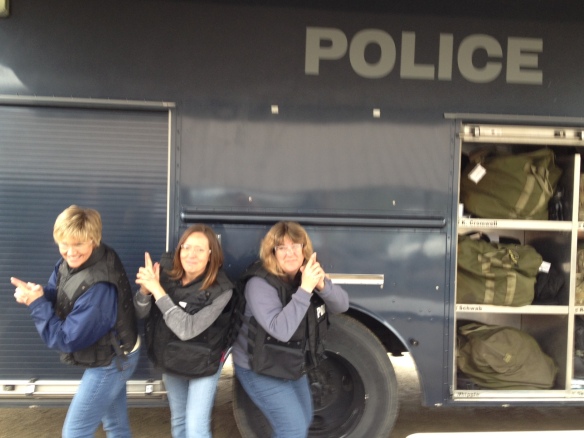A new outdoor obstacle course on Medford’s Roxy Ann Peak isn’t just another way for thrill-seekers to tackle a physical challenge.
“You also have emotional and intellectual fitness you can tap into,” says Erik Marter, co-owner of Synergo, which built the course.
The Prescott Park Challenge Course is a system of ropes, wires, swings, platforms and ladders — suspended 2 to 40 feet off the ground — among trees in the 1,740-acre city park. Opened in April, the course typically requires advance reservation by a large group, but two city-sponsored days this summer will give families and adults of all ages a chance to take the challenge.
“For the Rogue Valley, this was pretty special,” says Sheri Richmond-Getty, a Medford nurse who toured the park on its opening day. “I would be interested in seeing how it would push me.”
The course is designed to prod participants outside their comfort zones to achieve higher planes of mental and emotional health, according to Synergo. Navigated in a group, the course’s 15 elements enhance trust, cooperation, willingness to take positive risks, and to develop leadership skills. Certified Synergo employees facilitate the experience over several hours. The Tigard company operates a similar course by advance reservation at Earth Teach Forest Park near Ashland.
“Your local schools, nonprofits … businesses are realizing the importance of a healthy lifestyle,” says Marter. “It takes people out of a stuffy classroom … and gets them outside doing something.”
“I came up here thinking I was going to bring my kids,” says Richmond-Getty. “I thought this would be a fun thing for a group to do — a group of friends.”
The Chamber of Medford/Jackson County furnished the first official group to use the course. About 30 members capped off a nine-month leadership program at Prescott Park in mid-May.
“We thought, ‘Why not finish with a bang?’ ” says Brad Hicks, chamber president and chief executive. “It was an opportunity to find out what I was and wasn’t afraid of.”
Recalling the “leap of faith” gave chamber member and leadership student Bill Macy a rush more than a week later. While fellow participants secured the rope attached to Macy’s waist harness, he jumped from a platform high in the trees to catch and swing from a trapeze.
“You don’t have a clue until you go through it,” says Macy. “You really have to be open to personal growth and exploration.”
Skeptical of businesses claiming they can change lives, Macy says the challenge course made him a believer. He not only applied its lessons immediately to his job as director of Avamere Health & Fitness Club in Medford. He’s also trying to organize a group trip among club members. Most are adults 40 and older, but nearly all would be physically capable of using the challenge course, he says.
“Physical limitations are, a lot of times, self-created,” says Macy, adding that extreme physical fitness can, in situations like the challenge course, “almost be a handicap for people.”
“We work with professional athletes, and we work with people in drug- and alcohol-treatment centers … and people with disabilities,” says Marter.
Synergo imposes virtually no physical criteria other than the ability to walk unassisted on a variety of terrain and surfaces around the challenge course, as well as the capacity for following instructions and directions. Participants must sign a waiver with the company.
In general, participants should weigh between 60 and 300 pounds. More important than size and stature is whether harnesses and helmets fit properly to ensure participation in the course’s high elements. Synergo recommends wearing comfortable clothing appropriate for the weather and securely fastened, closed-toe shoes.
Some 300 park visitors for the city’s April preview day had the chance to test-drive three elements: the “leap of faith,” the “diversity trail,” similar to a tightrope stretched about 2 feet off the ground, and the “giant swing,” which, as its name implies, soars 40 feet above the ground revealing a panoramic view of the valley.
A peerless vantage point, the giant swing also serves as a metaphor for emotional release, says Marter.
“What’s something in your life that you need to release and get rid of?” he asks. “It’s a big, cathartic experience.”
“I found it supremely exhilarating,” says Macy. “You’re engaging in outdoor activity in a beautiful, protected area.”
More than two times the size of Medford’s other parks combined, Prescott’s remote, hilltop location means it gets only a tiny fraction of the others’ visitors. Tucked into the trees off a gravel road, the course is not obvious to passersby and can’t be operated unless Synergo staff is on scene.
Reserving the course for a group of up to 15 costs $600 to $1,200, with price determined by the complexity of desired activities. Groups must call Synergo directly at 503-746-6646.
City-sponsored days, July 14 and Aug. 18, reduce the cost to $45 for adults and $30 for children. Call city of Medford Parks & Recreation at 541-774-2400 to register. More lower-cost, challenge-course days likely will be scheduled later in the year, weather permitting, says Rich Rosenthal, the city’s recreation superintendant.
“It’s not just for thrill-seekers,” says Rosenthal. “There’s something for everyone there.”




